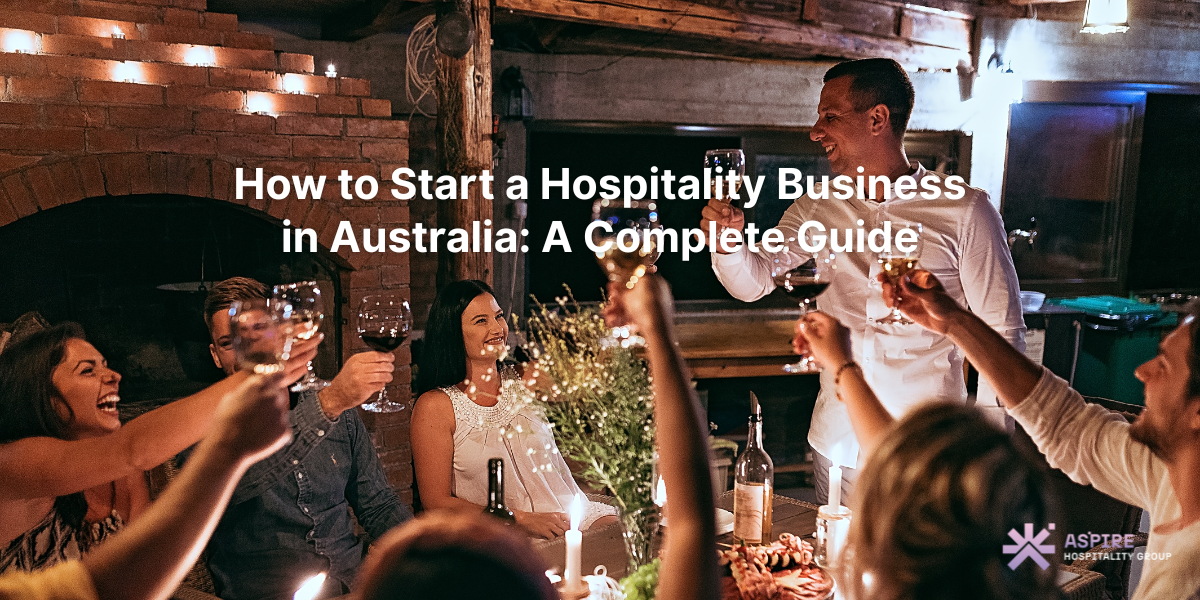- Mon - Sat: 8.00 - 18.00
- 411 University St, Seattle
- +1-800-456-478-23
7 Powerful Steps to Start a Successful Hospitality Business in Australia

The hospitality industry is one of Australia’s most dynamic sectors. From cafés and restaurants to hotels and event venues, it offers huge opportunities for entrepreneurs. But while the rewards can be significant, starting a hospitality business isn’t as simple as opening the doors and welcoming guests. It requires careful planning, compliance with regulations, and smart systems to ensure long-term success.
This guide walks you through the essentials of launching a hospitality business in Australia—from concept to compliance, operations to growth—so you can start with confidence.
Step 1: Define Your Concept and Market
Choosing the Right Concept
Your first step is to clarify what kind of hospitality business you want to run. Will it be a café, restaurant, bar, boutique hotel, or multi-purpose venue? Each comes with different requirements, investment levels, and customer expectations.
Market Research
Understanding your target market is critical. Look at:
- Location: Does your concept fit the local community?
- Competition: What are other venues offering, and how will you stand out?
- Customer demand: Is there room in the market for your idea?
A strong concept matched to real demand sets the foundation for success.
Step 2: Business Planning and Funding
Crafting a Business Plan
A well-structured business plan will guide your decisions and attract investors. It should include:
- Mission and vision
- Target audience
- Marketing and sales strategies
- Financial projections
- Staffing and operational plans
Securing Finance
Starting a hospitality business in Australia requires capital for fit-out, equipment, staff, and working capital. Options include:
- Personal savings
- Bank loans
- Investors or partners
- Government grants or programs supporting SMEs
Step 3: Legal and Regulatory Requirements
Licences and Permits
The hospitality industry is highly regulated. Depending on your venue type, you may need:
- Food business licence (through your local council)
- Liquor licence (if serving alcohol, regulated by state authorities)
- Health and safety compliance (food handling, hygiene, and workplace safety)
- Building permits (for fit-outs or renovations)
Insurance
Every hospitality business should have appropriate insurance, including public liability, workers’ compensation, and property cover.
Step 4: Building Your Operations
Staffing and Training
The hospitality industry is people-driven. Hiring skilled staff and investing in training is key. Roles may include:
- Front-of-house (servers, bartenders, reception)
- Back-of-house (chefs, kitchen hands, cleaners)
- Management (operations, HR, marketing)
Training in Responsible Service of Alcohol (RSA), customer service, and food handling is mandatory in many cases.
Systems and Technology
Smart systems make or break a hospitality business. Essential tools include:
- Point-of-Sale (POS) systems for payments and reporting
- Workforce management tools for rostering and payroll
- Inventory management to track supplies and reduce waste
- Customer Relationship Management (CRM) platforms for loyalty programs
AHG recommends adopting hospitality smart systems early to streamline operations and prepare for growth.
Step 5: Marketing and Brand Building
Building a Strong Brand
Your brand is more than a logo—it’s the story and experience you create. Consider your:
- Name and visual identity
- Venue design and atmosphere
- Tone of communication online and in person
Digital Marketing Strategies
In today’s competitive market, digital presence is essential. Key strategies include:
- Website: Mobile-friendly and optimised for SEO
- Social media: Regular updates on Facebook, Instagram, and TikTok
- Online reviews: Encourage satisfied customers to leave feedback
- Local directories: Listing your hospitality business on platforms like Alby to reach your community
Step 6: Delivering Customer Experience
Hospitality success is built on consistent, positive experiences. Focus on:
- Friendly, attentive service
- High-quality food, drinks, or accommodation
- Cleanliness and safety
- Responding to feedback and resolving complaints quickly
Happy customers become repeat customers—and your best marketing channel.
Step 7: Scaling and Growth
Once your business is stable, you can think about growth. Options include:
- Expanding services (e.g., adding catering or events)
- Opening new locations
- Developing a franchise-ready model through systemisation and consistency
Franchise-ready venues are especially attractive to investors. By building on hospitality smart systems, you can replicate success across multiple sites while maintaining quality.
Common Challenges in Starting a Hospitality Business
Starting a hospitality business isn’t without hurdles. Be prepared for:
- High competition: Standing out requires strong branding and service.
- Labour shortages: Skilled staff can be hard to find.
- Compliance costs: Licences, training, and insurance add up.
- Economic uncertainty: Rising costs and changing consumer habits impact margins.
The good news? With the right planning, technology, and support, these challenges can be managed.
Conclusion
Starting a hospitality business in Australia is both exciting and challenging. Success comes from a clear concept, strong systems, and a commitment to consistent customer experiences.
From licensing and staffing to marketing and scalability, every step requires careful planning—but the rewards are worth it. With the support of experienced partners like Aspire Hospitality Group, you can launch with confidence and grow sustainably.
Ready to start your hospitality journey? Talk to Aspire Hospitality Group today about building smart, scalable hospitality businesses.
